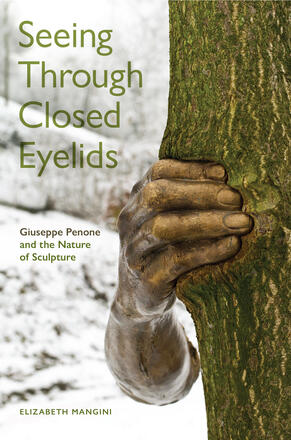
Seeing Through Closed Eyelids
Giuseppe Penone and the Nature of Sculpture
Description
Can a work of art help us know our world differently? In this first scholarly study of Giuseppe Penone, art historian Elizabeth Mangini argues that the Italian artist’s engagement of the body’s multiple senses constitutes a new theory of sculpture as a means to connect with and know the phenomenal world. Through close readings of signal works across Penone’s five-decade career – from his emergence in the context of 1960s Arte povera to his position as a pre-eminent contemporary artist today – Mangini demonstrates how Penone refuses modernist opticality, recasts artistic labour, and emphasizes a non-anthropocentric concept of time. Penone’s approach challenges viewers to broaden their sensory and temporal perceptions, creating structurally significant new ways to understand human experience.
Giuseppe Penone is best known for his engagement with trees, which he employs as raw material, imagery, and an active force in the creative process. Seeing Through Closed Eyelids suggests that such works materialize the perceptible tensions between any organism and its environment. By locating Penone’s art in its social context and connecting it to broader discourses about art’s status, theories of phenomenology, and the anthropocene, this book offers an original reading of Penone’s work, as well as a wider view of the artistic generation for whom sculpture was a means to probe the nature of experience itself at the dawn of postmodernism.
Reviews
"Though most often associated with Arte Povera, Giuseppe Penone’s artistic practice of the 1960s formed a phenomenon wholly unto itself. In cogent prose, Elizabeth Mangini’s Seeing through Closed Eyelids establishes the consequence of Penone’s corpus beyond any nominal affiliation or national ascription. Penone, she shows, developed not merely a body of work, but a theory of sculpture – one responsive to international tendencies but rooted in a local engagement with the phenomenology of nature. Examining interrelated bodies of work within a larger career, Mangini’s volume constitutes at once a careful examination of an individual oeuvre, and a case study of a fraught moment in post-war Italian culture. We find here a practice which insists upon the physical contingencies of its own making; which stages the effacement of artistic agency alongside quite personal articulations; and which foregrounds the (ever shrinking) porosity between cultural production and the natural world."
- Ara H. Merjian, professor of Italian studies and affiliate of the Institute of Fine Arts, New York University